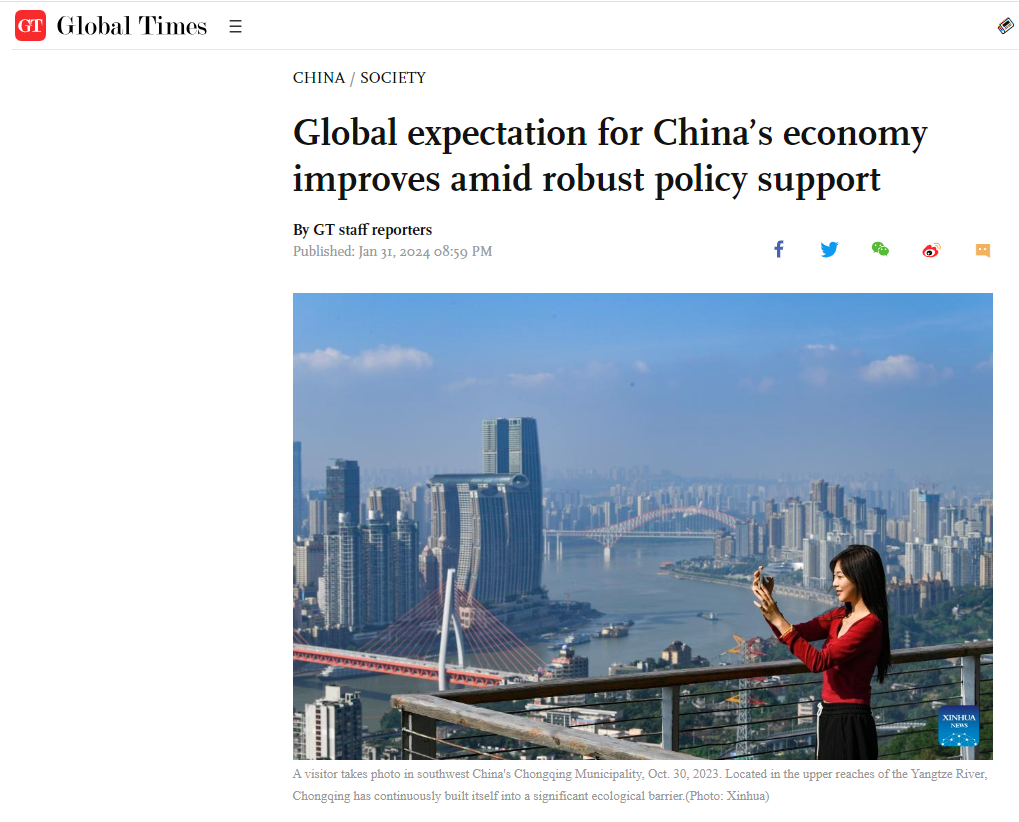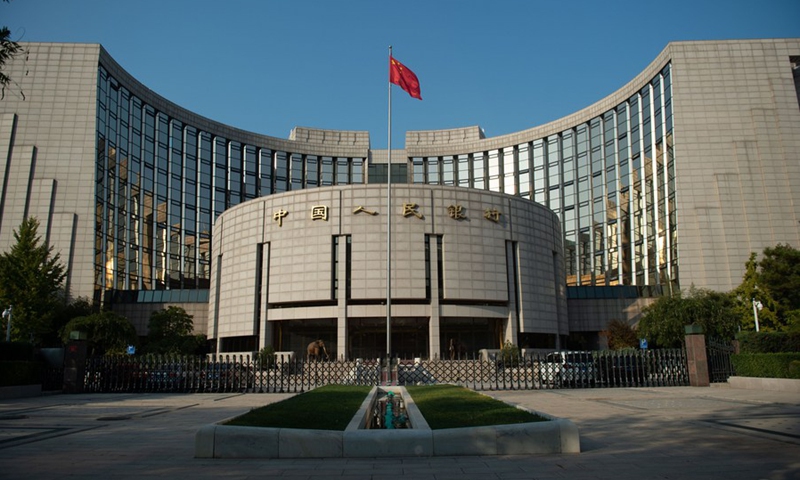LATEST INSIGHTS
Your Present Location: LATEST INSIGHTSJohn Ross: Global expectation for China’s economy improves amid robust policy support
Source: GT Published: 2024-01-31

As China has stepped up monetary and fiscal support for its economic recovery, both global and domestic expectations for China's growth prospect in 2024 are rising. In its latest report, the IMF has further raised its forecast for China's growth in 2024 to 4.6 percent, up 0.4 percentage point from its previous projection.
Economists said that as China's top policymakers have prioritized stabilizing economic growth this year, more policy measures will likely be implemented throughout the year to boost economic activity. While risks and challenges remain, there are also emerging positive signs in the Chinese economy suggesting China's economic growth in 2024 could be higher than expected, they noted.
In its World Economic Outlook released on Tuesday US time, the IMF projected that China's economy will grow by 4.6 percent in 2024, compared to its October 2023 forecast of 4.2 percent.
While a 4.6 percent growth in 2024 would be lower than China's actual GDP growth rate of 5.2 percent in 2023, it would still be significantly higher than projected growth in leading economies, including the US economy, which is expected to grow by 2.1 percent in 2024. The advanced economies as a whole are projected to grow 1.5 percent, while global growth is forecast to be 3.1 percent, according to the IMF.
Notably, the IMF report, in raising its forecast for global growth by 0.2 percentage point, cited three main factors - 'greater-than-expected resilience in the United States and several large emerging market and developing economies, as well as fiscal support in China.'
Chinese economists said the IMF's upgrade of its forecast for China's 2024 economic growth reflected its improving expectations in both China and overseas thanks to China's strengthening policy support.
'One of IMF's major assessments is that if China's policy support expands, economic operations will improve,' Hu Qimu, a deputy secretary-general of the digital-real economies integration Forum 50, told the Global Times on Wednesday, noting that the Chinese government has sent the signal of boosting economic growth this year.
Since the Central Economic Work Conference held in December 2023, which set economic policy priorities for 2024 and called for more policies that will help stabilize expectations, economic growth and employment, Chinese policymakers have taken major policy steps to consolidate the economic recovery.
Most recently, at a news conference on January 24, the People's Bank of China (PBC), the country's central bank, issued a package of major policies to boost the country's economy, including cutting the amount of cash that banks are required to hold as reserves to inject nearly $140 billion into the economy and lowering refinancing and rediscount rates.
At the news conference, PBC officials also addressed various hot topics facing the Chinese economy from the property sector to the capital market to local government debt, and they made it clear that they have plenty of room for policy maneuvers to tackle those challenges.
China had also announced in October 2023 the issuance of 1 trillion yuan ($139.3 bil-lion) in additional government bonds, with 500-billion-yuan worth of bonds having been issued in 2023 and the other half to be issued this year.

Photo shows an exterior view of the People's Bank of China in Beijing. Photo: Xinhua
Growing optimism
Economists said a growing number of positive signs show that China's economic activity is picking up pace in the new year and there is growing optimism for an even better growth prospect in 2024.
A survey released by the Global Times Institute on Tuesday showed that 79 percent of Chinese and global business executives are very confident or confident in China's economic development in 2024. And 80 percent of more than 470 respondents said they are very confident or relatively confident in China's future economic governance.
'I think the [IMF's] forecast is quite low. I believe China's economic growth could reach 5 percent or even higher than 5 percent in 2024,' Cao Heping, an economist at Peking University, told the Global Times on Wednesday, noting that China's structural shift has moved past 'the bumpy period,' after which growth speed will accelerate.
Many Chinese and global economists and institutions have also forecast a GDP growth rate of around 5 percent in China in 2024. Li Daokui, a prominent Chinese economist and director of Tsinghua University's Academic Center for Chinese Economic Practice and Thinking, told the Global Times in a previous interview on January 20 that China's economic growth rate is expected to reach around 5 percent in 2024. John Ross, a senior fellow at Chongyang Institute for Financial Studies at Renmin University of China, also said in an article published on the Global Times on January 18 that China should set a growth target of 5 percent or higher in 2024.
Also significantly, many Chinese localities have set relatively higher growth targets for 2024 during the local two sessions, with many economic powerhouses such as Beijing and Shanghai aiming for a growth rate of about 5 percent. Some localities such as Southwest China's Sichuan Province set a growth target of about 6 percent. Northwest China's Xinjiang Uyghur Autonomous Region set a growth target of around 6.5 percent.
Rising expectations for solid growth in China in 2024 despite risks and challenges reflect improving economic trends this year, Hu said, noting two major positive factors. First, consumers, after cutting back to 'deleverage' in 2023, will most likely increase spending; second, both monetary and fiscal policies will be 'more proactive' in 2024, the economist said.
China has seen a tourism boom since the start of 2024, with tourists flocking to top destinations across the country and a record 9 billion passenger trips are expected to be made during the upcoming travel rush for the Spring Festival - Chinese Lunar New Year - holidays, doubling the 2023 number and raising expectations for a consumption boom. There are also growing market expectations for more liquidity before and around the holidays to boost consumption.
In addition, the country has stepped up support for the private sector, which is crucial for efforts to stabilize expectations, economic growth and employment. At a news conference on Wednesday, officials from the State Administration of Market Regulation vowed to take various measures to help private firms to tackle difficulties and promote the sound development of the private sector.
Key Words: John Ross, China’s Economy, IMF























































































 京公网安备 11010802037854号
京公网安备 11010802037854号





